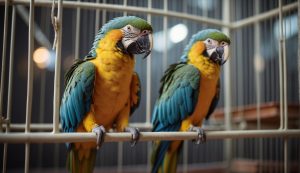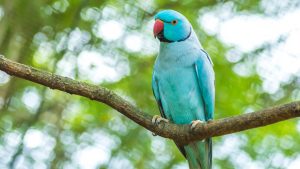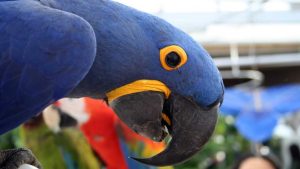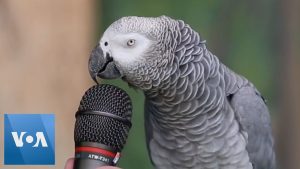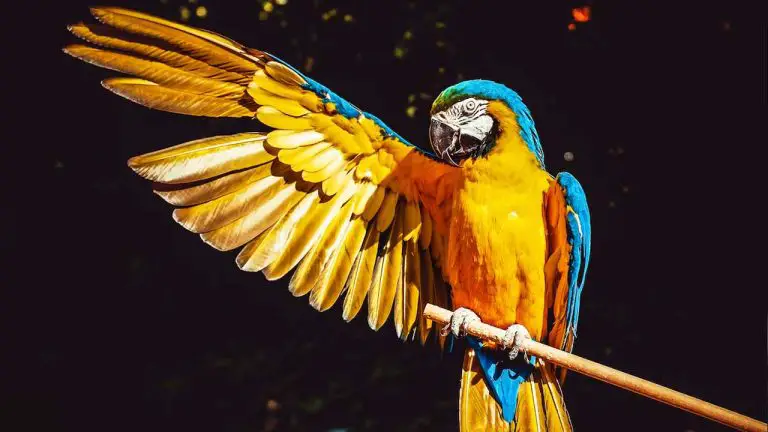Why Is My Parrot Making Weird Noises? Understanding Your Feathered Friend’s Vocalisations
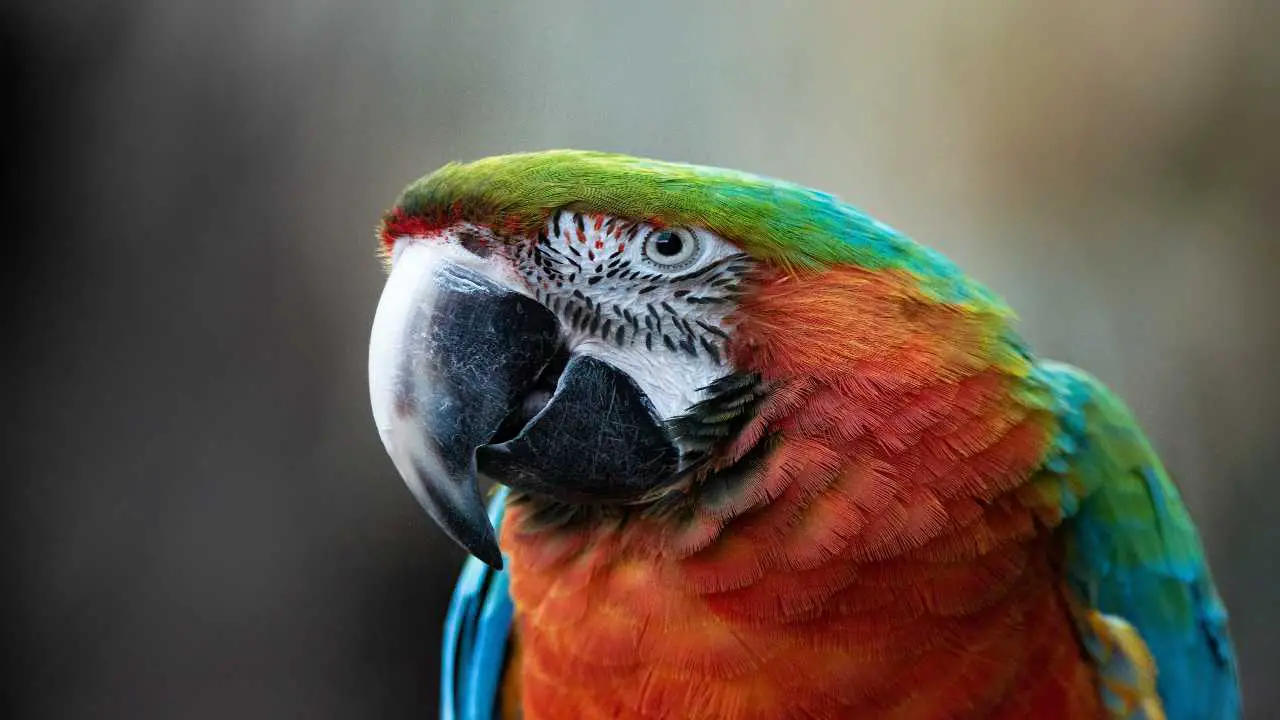
Parrots are known for their beautiful plumage, playful personalities, and their ability to mimic human speech. However, they are also known for making weird noises that can be confusing and even alarming to their owners. If you are a parrot owner, you may have found yourself wondering why your parrot is making strange sounds and what those sounds mean.
Understanding parrot noises is an essential part of being a parrot owner. Parrots use vocalizations to communicate with their owners and other birds, and each sound conveys a different meaning. Some noises are happy and contented, while others are alarming and indicate danger or fear.
By learning to interpret your parrot’s noises, you can better understand what your bird wants and needs.
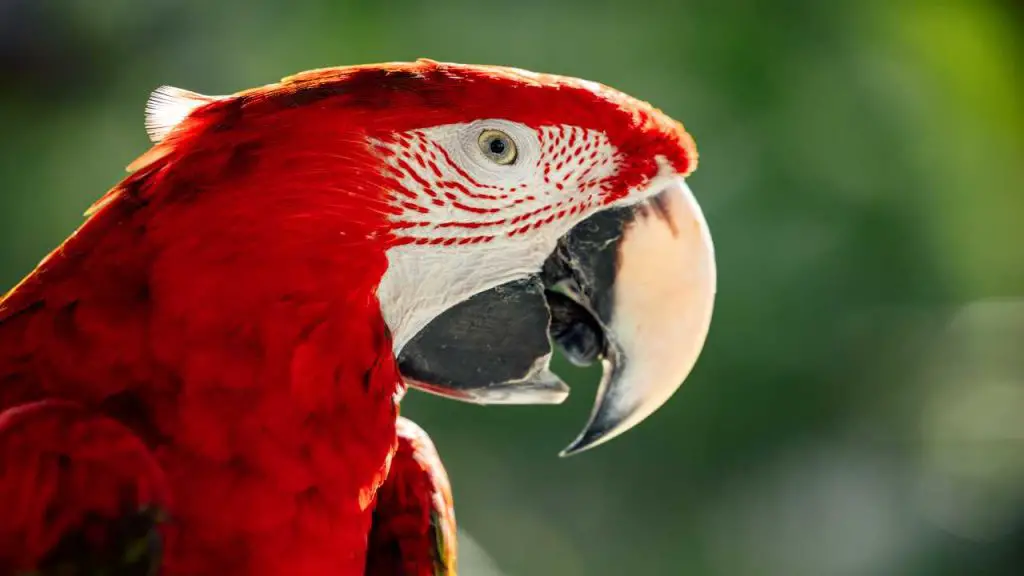
In this article, we will explore the reasons why parrots make weird noises and what those noises mean. We will discuss parrot emotions and how they are expressed through vocalizations, as well as how parrot health, environment, and behaviour can affect the sounds your parrot makes.
We will also look at specific parrot species and their unique vocalizations, and provide tips on how to respond to your parrot’s noises.
Key Takeaways
- Parrot noises are a form of communication and convey different meanings.
- Parrot emotions, health, environment, and behaviour can all affect the sounds your parrot makes.
- Understanding your parrot’s noises is key to being a good parrot owner.
Understanding Parrot Noises
As a parrot owner, it’s essential to understand the different noises your parrot makes and what they mean. Parrots use a variety of vocalizations to communicate with their owners and other birds. Here are some of the most common parrot noises and what they signify.
Vocalizations
Parrots use their voices to make a variety of sounds, from chirps and squawks to whistles and songs. Vocalizations are a way for parrots to communicate with their owners and other birds. Happy parrots often make cheerful noises, while unhappy parrots may make distressing sounds.
Squawking
Squawking is a loud, harsh noise that parrots make when they want attention or are feeling threatened. Squawking can also be a sign of boredom or frustration.
Purring
Purring is a soft, low-pitched noise that parrots make when they’re content and happy. It’s a sign that your parrot is relaxed and comfortable.
Beak Grinding
Beak grinding is a rhythmic, grinding noise that parrots make when they’re happy and relaxed. It’s a sign that your parrot is comfortable and content.
Growling
Growling is a deep, guttural noise that parrots make when they’re feeling threatened or aggressive. It’s a warning sign that your parrot is not happy and may bite.
Beak Clicking
Beak clicking is a sharp, clicking noise that parrots make when they’re feeling threatened or aggressive. It’s a warning sign that your parrot is not happy and may bite.
Chirping
Chirping is a soft, high-pitched noise that parrots make when they’re happy and content. It’s a sign that your parrot is relaxed and comfortable.
Crying
Crying is a loud, distressing noise that parrots make when they’re feeling scared or upset. It’s a sign that your parrot is not happy and may need comfort.
Screeching
Screeching is a loud, high-pitched noise that parrots make when they’re feeling threatened or scared. It’s a warning sign that your parrot is not happy and may bite.
Tongue Clicking
Tongue clicking is a soft, clicking noise that parrots make when they’re feeling content and happy. It’s a sign that your parrot is relaxed and comfortable.
Chattering
Chattering is a soft, chattering noise that parrots make when they’re feeling content and happy. It’s a sign that your parrot is relaxed and comfortable.
Squeaking
Squeaking is a soft, high-pitched noise that parrots make when they’re feeling content and happy. It’s a sign that your parrot is relaxed and comfortable.
Hissing
Hissing is a sharp, hissing noise that parrots make when they’re feeling threatened or scared. It’s a warning sign that your parrot is not happy and may bite.
Understanding your parrot’s noises is essential for maintaining a happy and healthy relationship with your bird. By paying attention to your parrot’s vocalizations, you can better understand their needs and emotions.
Parrot Emotions and Noises
Parrots are highly intelligent creatures that experience a wide range of emotions. They communicate these emotions through various vocalizations, which can range from happy chirps to distressing screams. Understanding the different types of noises your parrot makes can help you determine its emotional state and respond appropriately. Here are some common emotions and the noises that parrots make to express them:
Happiness and Contentment
When parrots are happy and content, they will often make soft cooing or purring noises. They may also whistle or sing a happy tune. These noises are usually soft and pleasant to listen to.
Anger and Rage
Parrots can become angry or enraged if they feel threatened or if their territory is invaded. When they are angry, they may make loud, aggressive noises, such as screeches or squawks. They may also hiss or growl to show their displeasure.
Fear and Distress
If a parrot is scared or distressed, it may make high-pitched, piercing noises, such as screams or shrieks. It may also flap its wings rapidly or try to hide. These noises can be very loud and may indicate that your parrot is in danger or experiencing extreme stress.
Boredom and Loneliness
Parrots are social creatures that require a lot of interaction and stimulation. If they are bored or lonely, they may make repetitive noises, such as squawking or whistling. They may also start to pluck their feathers or engage in destructive behaviours.
Affection and Comfort
When parrots are feeling affectionate or seeking comfort, they may make soft, gentle noises, such as coos or purrs. They may also nuzzle or snuggle up to their owner.
Excitement
Parrots can become very excited when they are playing or interacting with their owners. They may make happy chirps or trills, as well as fluff up their feathers or dance around.
Self-Soothing
Parrots may also make noises to soothe themselves, such as soft whistles or murmurs. These noises can be very calming and may indicate that your parrot is feeling relaxed and content.
Grieving
Parrots can experience grief and sadness just like humans do. When they are grieving, they may become very quiet and withdrawn, or they may make soft, mournful noises.
In conclusion, understanding your parrot’s vocalizations can help you determine its emotional state and respond appropriately. By providing your parrot with plenty of interaction, stimulation, and love, you can help ensure that it remains happy and healthy.
Parrot Health and Noises
Parrots are known for their vocalizations, and each sound they make conveys a different meaning. As a parrot owner, it’s essential to understand what your bird is trying to communicate through its noises. However, sometimes, parrots can make weird or unusual noises that may indicate an underlying health issue. In this section, we will discuss the different health conditions that may cause your parrot to make strange noises.
Illness
If your parrot is making weird noises and also exhibiting other signs of illness, such as reduced appetite, lethargy, or unusual behavior, it’s possible that the noises are due to illness. In such cases, it’s essential to take your parrot to an avian vet immediately. Some common illnesses that may cause parrots to make strange noises are respiratory infections, fungal infections, and bacterial infections.
Pain
Parrots may make weird noises when they are in pain. They may scream, squawk, or make other loud noises to express their discomfort. If you notice your parrot making such noises, it’s crucial to take them to an avian vet as soon as possible. The vet can examine your parrot and determine the underlying cause of the pain.
Injury
Parrots may also make weird noises if they have suffered an injury. They may scream or squawk to express their pain and discomfort. If you suspect that your parrot has suffered an injury, it’s essential to take them to an avian vet immediately. The vet can examine your parrot and determine the extent of the injury.
Disease
Parrots may make weird noises if they are suffering from a disease. Some common diseases that may cause parrots to make strange noises are psittacosis, aspergillosis, and polyomavirus. If you suspect that your parrot has a disease, it’s essential to take them to an avian vet immediately. The vet can examine your parrot and determine the underlying cause of the disease.
Conditions
Parrots may make weird noises due to various conditions such as stress, boredom, or anxiety. In such cases, it’s essential to identify the underlying cause of the condition and take steps to address it. Providing your parrot with enough mental and physical stimulation can help reduce stress and anxiety. Additionally, ensuring that your parrot is in a comfortable and safe environment can help prevent boredom.
In conclusion, if your parrot is making weird noises, it’s essential to take them to an avian vet immediately. The vet can examine your parrot and determine the underlying cause of the noises. By understanding the different health conditions that may cause your parrot to make strange noises, you can take steps to ensure that your parrot remains healthy and happy.
Parrot Environment and Noises
Parrots are social and intelligent creatures that require a suitable environment to thrive. A parrot’s environment can have a significant impact on their behaviour and vocalisations. In this section, we will explore how a parrot’s environment can influence their noises and vocalisations.
Cage
A parrot’s cage should be spacious enough for them to move around comfortably. A cage that is too small can cause stress and anxiety in parrots, leading to excessive vocalisations. Parrots need enough space to spread their wings and play with toys. A cage that is too cramped can also lead to boredom, which can cause parrots to make unusual noises.
Space
Parrots need ample space outside of their cage to exercise and play. A lack of space can cause frustration and anxiety in parrots, leading to excessive vocalisations. Parrots require a space where they can fly, climb, and explore. Providing a suitable space for your parrot can help reduce unusual vocalisations and promote a healthy environment.
Mate
Parrots are social creatures and require companionship. A lack of social interaction can cause parrots to become bored and stressed, leading to unusual vocalisations. Providing your parrot with a suitable mate can help reduce stress and promote a healthy environment.
Family Members
Parrots are highly social creatures and require interaction with their owners and family members. A lack of interaction can cause parrots to become bored and stressed, leading to unusual vocalisations. Providing your parrot with regular interaction and attention can help reduce stress and promote a healthy environment.
Threat
Parrots are sensitive to their environment and can become easily stressed by perceived threats. Loud noises, sudden movements, and unfamiliar objects can cause parrots to become anxious and make unusual noises. Providing a calm and predictable environment can help reduce stress and promote a healthy environment.
Predators
Parrots are prey animals and can become easily stressed by the presence of predators. Even the sight or sound of a predator can cause parrots to become anxious and make unusual noises. Providing a safe and secure environment can help reduce stress and promote a healthy environment.
Sudden Lights
Parrots are sensitive to sudden changes in light. Bright lights or sudden flashes can cause parrots to become anxious and make unusual noises. Providing a suitable environment with consistent lighting can help reduce stress and promote a healthy environment.
Parrot Behaviour and Noises
Parrots are social creatures that communicate through a variety of sounds and body language. Understanding what your parrot is trying to tell you is crucial for providing the best care possible. Here are some common parrot behaviours and noises and what they might mean.
Attention Seeking
Parrots are intelligent creatures that crave attention and interaction. If your parrot is making loud noises or flapping its wings, it may be trying to get your attention. Providing your parrot with plenty of toys and social interaction can help reduce attention-seeking behaviour.
Stress
Parrots can become stressed for a variety of reasons, including changes in routine, lack of social interaction, and illness. Signs of stress in parrots include biting, feather plucking, and vocalisations such as screaming or crying. If you suspect your parrot is stressed, it’s important to identify and address the underlying cause.
Fear
Parrots can become afraid of new people, objects, or situations. Signs of fear in parrots include cowering, hiding, and vocalisations such as squawking or hissing. It’s important to provide a safe and comfortable environment for your parrot and to slowly introduce new experiences to help reduce fear.
Aggression
Parrots can become aggressive for a variety of reasons, including fear, stress, or lack of socialisation. Signs of aggression in parrots include biting, lunging, and vocalisations such as screaming or growling. It’s important to identify and address the underlying cause of aggression and to provide your parrot with plenty of socialisation and positive reinforcement.
Biting
Parrots may bite for a variety of reasons, including fear, stress, or lack of socialisation. It’s important to identify the underlying cause of biting and to provide your parrot with plenty of socialisation and positive reinforcement. Avoid punishing your parrot for biting, as this can lead to increased fear and aggression.
Wing Flapping
Parrots may flap their wings as a form of exercise or to release excess energy. However, excessive wing flapping can also be a sign of stress or boredom. Providing your parrot with plenty of toys and socialisation can help reduce excessive wing flapping.
In summary, understanding parrot behaviour and noises is crucial for providing the best care possible. If you notice any concerning behaviours or noises, it’s important to identify and address the underlying cause to ensure your parrot’s health and happiness.
Specific Parrot Species and Their Noises
Cockatiels
Cockatiels are known for their whistling and chirping sounds. They also make a hissing sound when they feel threatened or scared. Cockatiels may also scream when they want attention or are feeling lonely. Some of the noises that a cockatiel makes might seem strange, but they are all part of their natural behaviour.
Cockatoos
Cockatoos are known for their loud screeching sounds, which can be heard from a distance. They may also make a whistling sound when they are happy or excited. Cockatoos are very social birds and they need a lot of attention and interaction with their owners. If they feel neglected, they may start to scream or make other loud noises.
African Grey Parrots
African Grey Parrots are known for their ability to mimic human speech and other sounds. They may also make a whistling or chirping sound when they are happy or excited. African Grey Parrots are very intelligent birds and they need a lot of mental stimulation to stay healthy and happy. If they feel bored or neglected, they may start to scream or make other loud noises.
Macaws
Macaws are known for their loud squawking sounds, which can be heard from a distance. They may also make a whistling or chirping sound when they are happy or excited. Macaws are very social birds and they need a lot of attention and interaction with their owners. If they feel neglected, they may start to scream or make other loud noises.
In summary, each parrot species has its own unique set of noises that it makes. Understanding these noises is important for owners to be able to communicate with their birds and provide them with the care they need. If you are concerned about your parrot’s noises or behaviour, it is always best to consult with a veterinarian or a bird behaviour specialist.
How to Respond to Your Parrot’s Noises
As a parrot owner, it’s important to understand your bird’s noises and what they mean. Here are some ways to respond to different types of parrot noises:
Positive Connotations
Parrots make a variety of noises that can indicate happiness and contentment. These noises include chirping, singing, and gentle squawking. If your parrot is making these noises, it’s a good sign that they are feeling comfortable and happy in their environment. You can respond to these noises by offering your parrot praise or treats.
Negative Connotations
Parrots can also make noises that indicate discomfort or distress. These noises include screeching, screaming, and aggressive squawking. If your parrot is making these noises, it’s important to identify the cause of their distress and address it. This could include adjusting their environment, offering more attention or socialization, or consulting with a veterinarian.
Night Frights
Some parrots may experience night frights, which are sudden episodes of fear or panic that occur at night. These can be triggered by loud noises, sudden movements, or changes in light. If your parrot experiences night frights, it’s important to provide a calm and reassuring presence. You can also offer a night light or cover their cage to reduce external stimuli.
Danger
Parrots may make loud and urgent noises to indicate danger or distress. These noises can include repeated squawking or screaming. If your parrot is making these noises, it’s important to identify the source of the danger and remove it if possible. You can also offer your parrot comfort and reassurance during these times.
In summary, understanding your parrot’s noises is an important part of being a responsible owner. By responding appropriately to your parrot’s noises, you can help ensure their comfort and well-being.
Conclusion
In conclusion, parrots are known for their vocalizations and noises. Parrots make different sounds depending on their mood, and it is essential to understand what these sounds mean to communicate better with your pet.
If your parrot is making strange noises, it could be a sign of distress or illness. It is crucial to observe your parrot’s body language and behaviour to determine what is causing the unusual sounds.
Some common noises that parrots make include chirping, squawking, purring, and clicking their tongue. Chirping usually means that the parrot is happy and content, while squawking indicates danger or attention-seeking behaviour. Purring is a sign of contentment, and clicking the tongue is a happy sound that parrots make when they are excited.
If your parrot is screaming excessively, it could be due to boredom, lack of attention, or anxiety. It is essential to provide your parrot with enough mental and physical stimulation to prevent excessive screaming.
In summary, parrots are fascinating creatures that make a variety of sounds and noises. Understanding what these noises mean can help you communicate better with your pet and provide them with the proper care and attention they need.
Frequently Asked Questions
What causes parrots to make crying noises?
Parrots may make crying noises when they are feeling sad or distressed. This can be due to a variety of reasons such as feeling lonely or bored, experiencing a change in their environment, or missing their owner.
It is important to provide your parrot with plenty of attention, toys, and a stimulating environment to prevent them from feeling sad or distressed.
Can parrots make noise while sleeping?
Yes, parrots can make noise while sleeping. They may make soft chirping or whistling sounds as they dream.
However, if your parrot is making loud or unusual noises while sleeping, it may be a sign of a health issue and you should consult a veterinarian.
Why do parrots make purring sounds?
Parrots may make purring sounds when they are content and relaxed. This is a sign that they are feeling comfortable and happy in their environment.
Purring can also be a self-soothing behaviour that helps them to relax and fall asleep.
What does it mean when a parrot makes a clicking sound?
When a parrot makes a clicking sound, it can be a sign of aggression or defensiveness. They may be trying to warn you to stay away or protect their territory.
However, clicking can also be a normal part of a parrot’s vocalisation and may not always indicate aggression.
Why do birds make squeaking noises?
Birds may make squeaking noises as a way of communicating with other birds or expressing excitement.
Squeaking can also be a sign of stress or discomfort, so it is important to pay attention to your bird’s body language and behaviour to determine the cause of the noise.
What are some happy sounds that parrots make?
Parrots may make a variety of happy sounds when they are feeling content and happy.
These can include chirping, whistling, singing, and even mimicking human speech. Pay attention to your parrot’s body language and behaviour to determine what sounds they make when they are feeling happy and relaxed.

